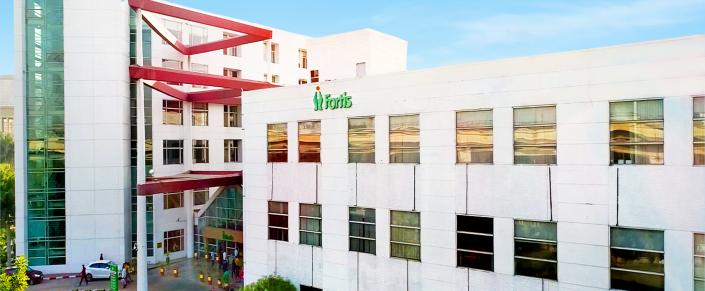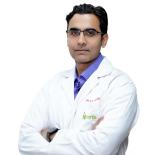Fortis Hospital, Noida
Fortis Hospital, Noida is one of the oldest & most trusted hospitals in Noida. Fortis Hospital, Noida is a multi-specialty tertiary care hospital that has played a pivotal role in transforming medical healthcare infrastructure in the NCR region.
236
Bedded Hospital
12
OTs & 92 ICU Beds
24*7
Emergency facility
About The Department of General Surgery, Fortis Hospital, Noida
Department of General Surgery at Fortis Hospital, Noida is a surgical specialty that deals with surgeries related to the abdominal area including the digestive tract like oesophagus, gall bladder, stomach, intestines, anus, etc. General surgeons perform minimally invasive techniques like laparoscopy which involves very small cuts thereby resulting in short hospital stays & early recovery. The department is also supported by specialists dealing in Gastroenterology who specialize in the medical management of conditions related to the digestive system. The experts at Fortis Noida deal with issues related to digestive health.
General surgeons & Gastroenterologists at Fortis Hospital, Noida are trained to treat the entire gamut of any medical & surgical issues related to the Digestive system. The doctors here have an experience of more than three decades & specialize in endoscopies, advanced laparoscopic surgery, minimally invasive techniques, etc
General surgeons & Gastroenterologists at Fortis Hospital, Noida are trained to treat the entire gamut of any medical & surgical issues related to the Digestive system. The doctors here have an experience of more than three decades & specialize in endoscopies, advanced laparoscopic surgery, minimally invasive techniques, etc

Why Choose Us
-
30+ Years of Experience
-
Experienced team of doctors and surgeons
-
Latest laparoscopic procedures
-
Advanced surgical equipment for best outcomes
-
Multi-speciality departmental approach
Medical Conditions Related To General Surgery & Gastro
- Treatment
-

The Department of General Surgery at Fortis Hospital, Noida has highly skilled renowned general surgeons and uses advanced technologies to deliver the best treatment to patients. We provide treatments and surgeries related to Gall bladder stones, Hernia, Appendix, Anal fissures, Haemorrhoids, Breast issues, Colorectal issues, Obesity, Irritable bowel syndrome, Muscular Dystrophy, Acute Spinal Cord Injury, GERD (Gastroesophageal reflux disease), Celiac disease (gluten intolerance), Diarrhea, constipation, Stomach ulcers or polyps, Colon cancers
Our Team of Experts
Find us
Fortis Hospital, Noida
B-22, Sector 62, Gautam Buddh Nagar, Noida,
Uttar Pradesh 201301
B-22, Sector 62, Gautam Buddh Nagar, Noida,
Uttar Pradesh 201301
84477 17722
Emergency No
0120 -2400444
Ambulance
105010
Select Adword Type
Google Adword
FAQs
-
1. What is general surgery?General surgery is a medical specialty that focuses on the surgical treatment of a wide range of diseases and conditions affecting various organs and body systems, such as the digestive system, endocrine system, and vascular system.
-
2. What are some common surgical procedures performed by general surgeons?General surgeons perform a variety of surgical procedures, including but not limited to appendectomy, cholecystectomy, hernia repair, mastectomy, colectomy, gastrectomy, thyroidectomy, and vascular surgeries.
-
3. How long does it take to recover from general surgery?Recovery time after general surgery varies depending on the type and extent of the surgery. It can take anywhere from a few days to several weeks or months to fully recover.
-
4. Will I have scars after general surgery?Most surgeries leave scars, but the size and appearance of the scar depend on various factors, such as the location of the incision, the type of surgery performed, and the patient's healing ability.
-
5. Can I eat and drink before general surgery?Your surgeon will provide you with specific instructions regarding food and drink before the surgery. Generally, you may be required to fast for a certain amount of time before surgery to avoid complications related to anesthesia.
-
6. What are the symptoms of Gall Bladder stones?The symptoms of gallstones include: - Pain in the abdomen & back - Pain is severe and infrequent - Increase in abdominal pain after eating a fatty meal - Jaundice - Fever & pain, if the gall bladder or bile duct becomes infected
-
7. What is the surgical treatment for Gallstones?80% of people with Gallstones need surgery. The surgeon will remove your entire gallbladder and this is known as Cholecystectomy. There are two ways of performing Cholecystectomy: i. Laparoscopic Cholecystectomy: This is the most common way of having the gallbladder removed. This is also known as keyhole surgery. In this keyhole surgery, the surgeon can remove the gallbladder without making a large incision on your abdomen. ii. Open Cholecystectomy: During this procedure, the surgeon removes the gallbladder through a 5-8 inch incision in your abdomen. An open cholecystectomy is recommended over laparoscopic surgery if your gallbladder is severely inflamed, or if the stone has passed out of the gallbladder and into the bile duct.
-
8. What is a hernia?A hernia is a condition that occurs when an organ, tissue, or fat bulges through a weak point or rips off the surrounding muscle or tissue. Hernias can occur in several parts of the body, but most commonly in the abdomen. The most common types of hernias include inguinal hernia (groin), femoral hernia (upper thigh), umbilical hernia (belly button), incisional hernia (resulting from a surgical incision), and hiatal hernia (diaphragm).
-
9. What are the benefits of Laparoscopic Hernia repair?- Less pain - Less blood Loss - Minimal Scar - Faster recovery - Lesser chances of getting infections - Higher success Rate
-
10. What is severe obesity?Severe obesity, also known as "morbid obesity," is defined as being 100 pounds (45.5 kg) or 100% of one's ideal body weight. This condition is linked to the emergence of potentially fatal complications such as hypertension, diabetes, and coronary artery disease, to name a few. There have been various therapeutic approaches to advocate this problem, including low-calorie diets, medication, behavioral modification, and exercise. However, surgical intervention is the only treatment that has been shown to be effective in the long-term management of morbid obesity.
-
11. What are the benefits of bariatric surgery or weight loss surgery?- Improved longevity - Long-term weight loss success - Better quality of life
-
12. What is appendicitis and how appendicitis can be treated?Appendicitis is the painful swelling of your appendix, a finger-like pouch attached to your large intestine. Appendicitis is considered a medical emergency because a swollen appendix has the potential to rupture. A ruptured appendix is extremely dangerous. Appendicitis treatment usually involves surgery to remove the inflamed appendix and this is called an appendectomy. Before surgery, you may be given a dose of antibiotics to treat the infection.
-
13. What are varicose veins?Varicose veins are blue, swollen, and twisted veins that can be seen and felt under the surface of your skin. They are caused by leaky valves and weakened walls of the veins.
-
14. What are the treatment options for varicose veins?The various treatment options for varicose veins are: - Laser treatment - Radiotherapy ablation (RFA) - Sclerotherapy - Ligation and exercise of varicose veins
-
15. What is piles?Piles or hemorrhoids are swollen blood vessels in the anal passage. There are two circular bunches of veins, one inside the anal canal and the second at the anal verge. Generally, they are called internal and external hemorrhoids. The symptoms of piles are – a lump around the anus, a feeling of full bowels even after going to the toilet, Bright red blood during a bowel movement in drops or even squirts, itching in the anus, mucus discharge when emptying the bowels, and pain while defecating.
-
16. What is the best treatment options for piles?The best treatment for Piles is Advanced Laser Treatment - Faster recovery - Less pain - Minimal scars - Minimal Blood loss - Shorter hospital stay


